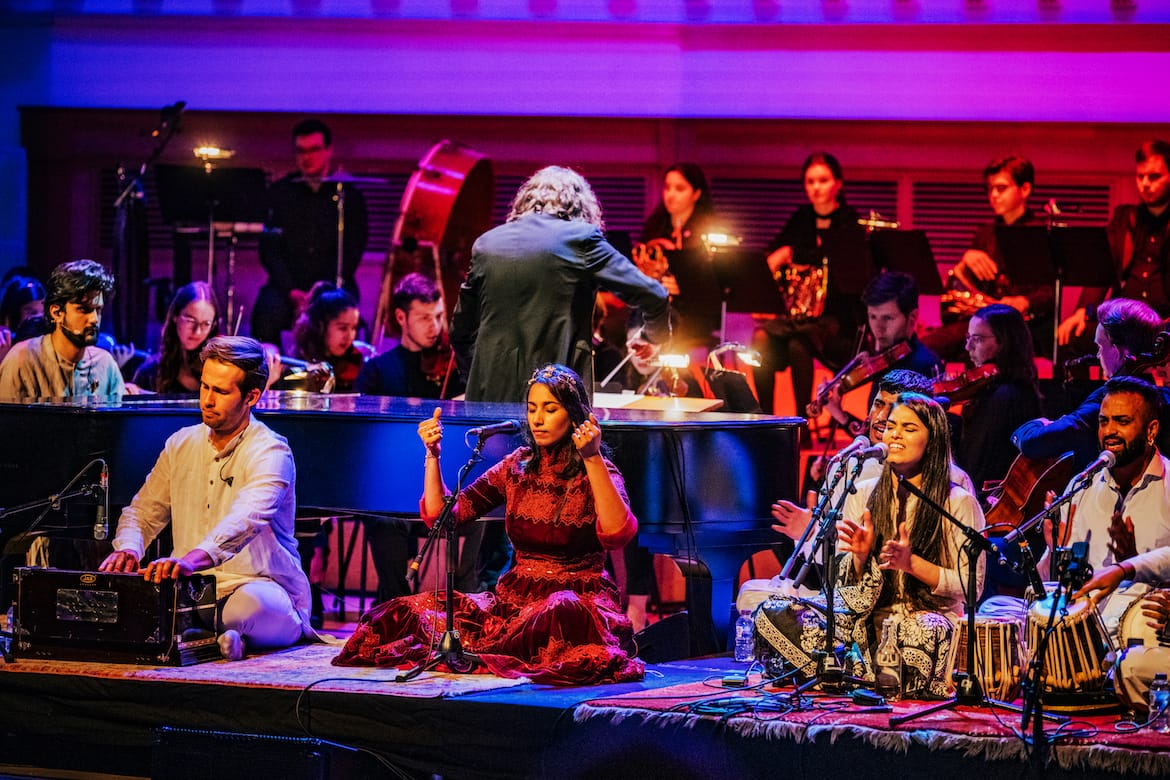The Orchestral Qawwali Project caused quite a stir at Celtic Connections last year when they opened for Anoushka Shankar and the Scottish Chamber Orchestra, gaining a very enthusiastic audience response beyond what you would typically expect for a support act. It was also the first time they had performed with a full orchestra. At the start of the performance, they gave credit from the stage to the Festival for taking a chance on them, citing it as opening up many other opportunities, not least making their first album which has just been released and includes one song from last year’s performance.
The project combines old and new, blending Sufi Islamic devotional singing, Indian classical music and western orchestral arrangements. The project’s music is composed and directed by Rushil Ranjan, mainly playing piano on stage, fronted by singer Abi Sampa (few Qawwali singers have been women), with tabla player Amrit Dhuffer – the engine room that underpins much of what you hear.
A packed stage found room for a three-man, one-woman Qawwali choir (hand claps as much a part of their role as singing), harmonium, electric bass, Alice Allen on cello and the Royal Conservatoire of Scotland Orchestra conducted by the indefatigable Greg Lawson. They began with Man Kunto Maula, which Rushil introduced as the first piece they did together (it was also a YouTube phenomenon three years ago). A harmonium drone preceded Abi’s vocal, soon joined by piano and orchestra, tabla and hand claps picking up the rhythm. You can’t fail but be stopped in your tracks by Abi’s truly astonishing singing – forceful yet celestial, consummately navigating the harmonic and rhythmic intricacies of the song versions of the centuries-old devotional poems – animatedly moving her arms throughout. She immediately had the audience completely enthralled.
Qawwali music will, for many, bring to mind the late, legendary Nusrat Fateh Ali Khan, and his influence was unsurprisingly writ large throughout the show, with a majority of the songs being versions of his arrangements. It is also notable that tabla player Amrit Dhuffer is a student of Ustad Dildar Hussain Khan, who was Nusrat’s tabla player. Most songs began simply, usually with Rushil’s piano before Abi’s vocal came in, and then adding other instruments before building the swell with the orchestra, choir, hand claps and tabla. On Nusrat’s Mera Piya Ghar Aya, a shorter, less intense number than most others, piano and vocal were initially intertwined with Alice Allen’s rich cello and bass guitar. Another of Nusrat’s, Ya Mustafa, had a conversational back and forth between Abi’s vocal and the orchestra’s strings and built to a trademark ecstatic Qawwali climax. Wohi Khuda Hai featured sweeping strings and punchy, cadenced cello.
Rushil was a singer songwriter earlier in his career, and he told us some of his and Abi’s initial efforts combined his songs with other forms and, picking up a guitar, introduced Hold This as a mishmash, which was sung, first by him and then by Abi, in a mix of languages, although it didn’t carry the strong impact of the Qawwali numbers that made up the rest of the set.
Two other Nusrat numbers had at one and the same time the familiarity of his signature sound and the imprint of something innovative. Dam Dam Karo Fareed included the addition of trumpet on top of piano and vocal at the start, adding a lovely fit ethereal brass layer to a song that typifies the many parts that constitute Qawwali, not least the switches from solo to choral singing, with shifting rhythms and intensity, but the difference illuminated by the tabla’s tempo being overlayed with swirling strings. Dam Mast Qalandar, the song taken from last year’s show for the album, was a perfect, triumphant last number. When it starts with just piano and a traditional fiddle-style delivery of the melody on violin, you could be forgiven for momentarily thinking you had been transported to an entirely different Festival gig. The song builds and builds before being punctuated by a dazzling tabla solo by Amrit and a final climactic burst from the whole ensemble. It is fair to say that the audience erupted after that last song, cheering wildly and giving one of the longest-standing ovations I’ve ever witnessed before the musicians left the stage. But that wasn’t the end, as the audience was determined not to leave until they’d heard more – mention of a curfew making no difference. The musicians eventually returned, a little tentatively, because, Rushil said, they hadn’t got any more songs ready. Still, he asked if the audience would mind if they repeated one from earlier – the crowd, needless to say, didn’t mind at all, and Dam Dam Karo Fareed sent us, replete, on our way. Some attempts to add orchestral arrangements to traditional music don’t always hit the mark, but this was an electrifying performance; Rushil and Abi building on the deep Qawwali tradition to create something new, coherent and potent, which had everyone in City Halls Glasgow in raptures.

To give you an idea of the music, watch the video at the end of this article that they released in late 2021 for Ghar Aa, sung by Abi Sampa and Amrit Dhuffer. It features dancers from the Aakash Odedra Company and SHIAMAK UK.
